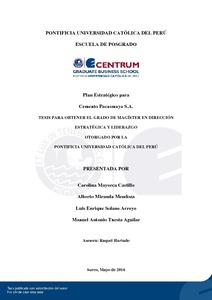| dc.contributor.advisor | Hurtado Lozano, Raquel | |
| dc.contributor.author | Mayorca Castillo, Carolina | es_ES |
| dc.contributor.author | Miranda Mendoza, Alberto | es_ES |
| dc.contributor.author | Solano Arroyo, Luis Enrique | es_ES |
| dc.contributor.author | Tuesta Aguilar, Manuel Antonio | es_ES |
| dc.date.accessioned | 2017-02-28T16:20:08Z | |
| dc.date.available | 2017-02-28T16:20:08Z | |
| dc.date.created | 2016 | |
| dc.date.issued | 2017-02-28 | |
| dc.identifier.uri | http://hdl.handle.net/20.500.12404/7986 | |
| dc.description.abstract | Este documento constituye un planeamiento estratégico para la empresa Cementos
Pascamayo, cubriendo el período 2016-2030. Se proyecta que al finalizar este plazo la
empresa estará entre las tres primeras de América Latina, cubriendo el Perú y con presencia
en otros países de la región. Para ello deberá ampliar su infraestructura, realizar aventuras
conjuntas en mercados extranjeros y desarrollar nuevos productos, entre otros. Los objetivos
de largo plazo que se han establecido son: (a) alcanzar ventas de S/. 2,154 millones en el año
2030; (b) para el año 2030, tener un rendimiento sobre el patrimonio o ROE superior a
12.5%; (c) en el año 2030, Cementos Pacasmayo obtendrá un reconocimiento a las mejores
prácticas de RSE en América Latina; y (d) el 70% de los equipos y maquinarias que estén
operativos en el año 2030 tendrán menos de cinco años, encontrándose en su período de vida
útil.
Esto se logrará con el cambio en la estructura organizacional, incorporando un área
financiera, separada de la administrativa, así como reforzando el área operativa. Con esta
nueva estructura se logrará la implementación de las siguientes estrategias, que son el
resultado de un cuidadoso planeamiento estratégico: (a) integrarse horizontalmente al adquirir
cementeras y concreteras pequeñas; (b) desarrollar el producto concreto, incrementando las
ventas a clientes actuales; (c) diversificarse concéntricamente al ofrecer crédito a los clientes
finales de la red DINO; (d) desarrollar nuevos mercados en el sur del Perú; (e) penetrar el
mercado del centro del Perú; (f) desarrollar los mercados de Bolivia y Ecuador; (g) integrarse
verticalmente hacia atrás, dando mantenimiento a la flota de camiones concreteros y
maquinarias. Para el control de la implementación estratégica se ha creado el Tablero de
Control Balanceado, herramienta que contiene índices para cada objetivo de corto plazo y en
caso de que no se estén alcanzando las metas propuestas será necesario implementar acciones
correctivas | es_ES |
| dc.description.abstract | This document is a strategic plan for the company Cementos Pascamayo, covering the
period 2016-2030. It is projected that by the end of this period the company will be among
the first in Latin America three covering the presence in Peru and other countries in the
region. To do this you must expand its infrastructure, conduct joint adventures in foreign
markets and develop new products, among others. The long-term goals that have been
established are: (a) achieve sales of S /. 2,154,000 in 2030; (B) by 2030, have a return on
equity or ROE higher than 12.5%; (C) 2030, Cementos Pacasmayo get a recognition of the
best practices of CSR in Latin America; and (d) 70% of the equipment and machinery to be
operational in 2030 will be less than five years and are at their shelf life.
This is achieved with the change in the organizational structure, incorporating a
financial area, separate from the administrative as well as strengthening the operational area.
With this new structure to implement the following strategies, which are the result of careful
strategic planning be achieved by: (a) integrated horizontally by acquiring small cement and
cement trucks; (B) develop the particular product, increasing sales to existing customers; (C)
diversify concentrically to offer credit to end customers DINO network; (D) develop new
markets in southern Peru; (E) market penetration of central Peru; (F) develop markets for
Bolivia and Ecuador; (G) vertically integrate backwards, giving maintenance to the fleet of
cement trucks and machinery.
In order to control and evaluate strategic implementation, the Balanced Score Card
will be used. It contains one index for each short term goal, and in case that the results are not
as expected, leader would be ready to apply corrective actions instantly | es_ES |
| dc.language.iso | spa | es_ES |
| dc.publisher | Pontificia Universidad Católica del Perú | es_ES |
| dc.rights | info:eu-repo/semantics/openAccess | es_ES |
| dc.rights.uri | http://creativecommons.org/licenses/by-nc-nd/2.5/pe/ | * |
| dc.subject | Cemento -- Industria y comercio -- Perú | es_ES |
| dc.subject | Planificación estratégica | es_ES |
| dc.title | Plan estratégico para Cemento Pacasmayo S.A. | es_ES |
| dc.type | info:eu-repo/semantics/masterThesis | es_ES |
| thesis.degree.name | Maestro en Dirección Estratégica y Liderazgo | es_ES |
| thesis.degree.level | Maestría | es_ES |
| thesis.degree.grantor | Pontificia Universidad Católica del Perú. CENTRUM | es_ES |
| thesis.degree.discipline | Dirección Estratégica y Liderazgo | es_ES |
| renati.discipline | 419397 | es_ES |
| renati.level | https://purl.org/pe-repo/renati/level#maestro | es_ES |
| renati.type | https://purl.org/pe-repo/renati/type#tesis | es_ES |
| dc.publisher.country | PE | es_ES |
| dc.subject.ocde | https://purl.org/pe-repo/ocde/ford#5.02.04 | es_ES |






